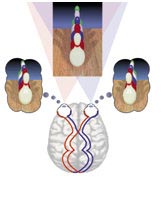What is Vision Therapy?
Visual conditions that cannot be treated adequately with glasses and contact lenses are often referred to as “functional” vision problems. Vision Therapy is an individualized, supervised, treatment program designed to correct these visual performance and visual-perceptual deficiencies. Vision Therapy addresses functional vision problems such as:

- eye alignment
- tracking and eye teaming
- focusing abilities
- eye movements
- visual information processing
- visual-vestibular integration
Every patient is different, so before we begin, we do special visual-perceptual and visual skills testing to determine what areas need improvement. Then an individualized protocol is prescribed involving a combination of selected eye movements, gross-motor, fine-motor, and perceptual training routines. These activities require specialized equipment not found in typical practices including trampolines, balance boards, dedicated computer set-ups, prisms glasses and unique devices designed to improve and integrate eye-hand coordination, eye-body movements and visual-vestibular processing pathways.
How long does it take?
The average program is completed in 12 weekly sessions over a 3-month period. More serious or complex cases can run longer and some simple problems can be taken care of in less time. Dr. Mietus prescribes an individualized program for each patient after a thorough eye exam and functional vision assessment. The weekly one hour office visits with his vision therapist provide one-on-one therapy. The patient is given exercises to do at home between appointments, preferably daily, but a minimum of 4 days per week. This home therapy is an essential part of the program. Much like in learning to play piano, you have to practice to get good at it!
Why haven’t I heard of this before?
Behavioral Optometry and Vision Therapy have been practiced for decades and the specialty continues to evolve. Because of the specialized training, office equipment, and scheduling necessities of a vision therapy practice, most doctors take the more conventional approach to vision care. The specialty is beginning to grow more rapidly now as the success of vision therapy becomes more widely recognized.
Most people know that having 20/20 vision is a good thing. Most schools and doctors are also under the impression that if you have 20/20 vision…“your eyes cannot be part of the problem.” This could not be further from the truth. This popular misconception has caused countless children and adults to struggle needlessly against correctable, but “hidden”, visual handicaps.
We tend to take it for granted, but the act of reading requires an incredible degree of precision in the way the eyes must follow each other along a line of print. They dance across the page like Fred Astaire and Ginger Rogers, gliding effortlessly from one word to the next. As in dancing, some of us are not as gifted as others. But, just as anyone can learn to dance, with Optometric Vision Therapy, tracking and focus skills can be improved.
Sometimes, the mind’s visual-processing “software” may be incomplete or disorganized. This can cause a host of problems, including an inability to easily “visualize” things that are read or form mental pictures. Another is visual-spatial processing disorder. This causes poor laterality awareness and the ability to differentiate RIGHT from LEFT and leads to letter and number reversals and problems with math, following instructions and organizing written work on the page. Visual-motor skills can be deficient and lead to eye-hand coordination problems, poor handwriting and difficulty playing sports. Collectively, these are referred to as visual-perceptual problems and are very treatable with vision therapy.

Vision Therapy treats:
Vision-related Dyslexia • ADHD • Reading Problems • Eye Tracking • Binocular Vision • Lazy Eye • Convergence Insufficiency • Depth Perception • Double Vision • Cross-eyed • Eye Turns • Visual Rehab • Special Needs • Developmental Delays • Brain Injured • Autistic Spectrum Disorders • Stroke • Visual Stress with Reading and Computers • Blurry Vision at Near • Headaches • Motion Sickness • Sports Vision • Hand-Eye Coordination • Post-Concussion Therapy
TEDx Talk – Vision Therapy
Check out the video!
Check out the video!
Vision Therapy Results
This video shows the immediate and dramatic improvements in reading fluency Dr. Mietus achieves with his unique and powerful prescribing methods. His “Hypertracking” and “Phorometric Balance” techniques are able to address the most challenging visual conditions. These concepts are not yet realized in general optometric and opthamological practice. Sometimes coupled with vision therapy, these special prism and lens prescriptions off relief from conditions including:
• Reading and tracking problems
• Double vision
• Chronic headaches and migraine
• Poor Balance, motion sickness and vertigo
• “Dyslexia” and “Attention Deficit Disorder” (often misdiagnosed and having a visual basis)
